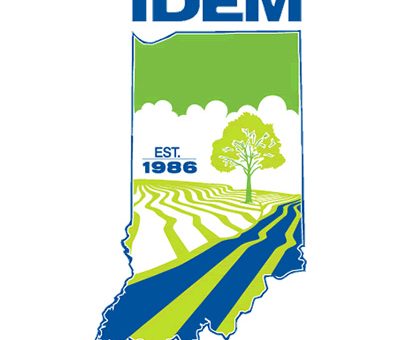
INDIANAPOLIS – On Wednesday, the Indiana Department of Environmental Management (IDEM) awarded the 2023 Governor’s Awards for Environmental Excellence to six recipients during the annual Partners for Pollution Prevention Conference and Tradeshow in Indianapolis.
“For nearly 30 years, the Governor’s Awards for Environmental Excellence has recognized Indiana citizens, government agencies, businesses, organizations, and educational institutions for their efforts to positively impact Indiana’s environment. The winners here today represent the most innovative, transferrable, and effective projects with measurable environmental, economic, and social benefits,” said Indiana Governor Eric J. Holcomb.
The Governor’s Awards for Environmental Excellence are Indiana’s most prestigious environmental recognition awards. They are reserved for the most innovative, sustainable, and exemplary programs or projects that positively impact Indiana’s environment and demonstrate measurable environmental, economic, and social benefits. The selection process is highly competitive, and only one award per category is presented each year.
John Roeder, Senior Operations Director for Governor Holcomb’s Office, presented the awards.
2023 Categories and Winners
Energy Efficiency and Renewable ResourcesGM Fort Wayne Assembly
Energy Performance Project and Steam Elimination Project
Fort Wayne Assembly has invested in a facility-wide energy savings improvement project. This monumental project was focused on the goal of eliminating steam from the facility to dramatically improve the efficiency of the central utility plant, heating and cooling a 5 million sq. ft. facility. The central focus of the project revolves around a new waste heat recovery system that captures otherwise wasted heat from four 1.6-megawatt onsite generators. This reduces the consumption of natural gas that would otherwise be required to heat the plant.
The waste heat is transformed into usable heat by eight large heat recovery units (exhaust and water). It is utilized by the main central utility building to provide heating and cooling to the main assembly buildings through its Hot/Chilled Water Seasonal Loop.

Environmental Education and Outreach
Red-tail Land Conservancy
Growing Home™ Habitat Certification program
Growing Home™ is a community-driven conservation program that brings birds, bees, and butterflies to east central Indiana. This program educates, encourages, and empowers community members to transform their yard or garden into a habitat that attracts and supports wildlife. Requirements for a Growing Home Certification include having two sources of food, one source of water, one source of cover, three species of native plants, two conservation practices, none of Indiana’s banned plants, and at least 50 square feet of garden area. Since Growing Home’s inception, 76 habitats have been certified in 12 cities across seven counties. Through the certification of homegrown habitats, Growing Home™ is creating a network of pocket nature preserves that beautify urban spaces and provide vibrant places for people and wildlife to thrive.

Greening the Government
Veterans Administration (VA) Northern Indiana Health Care System Nutrition and Food Service
Green Environmental Management System Greening the VA Initiative
VA Northern Indiana Health Care System launched the Nutrition and Food Service Green Environmental Management System Greening the VA Initiative to proactively approach and provide mitigation to several significant aspects facing the population today. VA Northern Indiana was able to create a state-of-the-art food sustainability program with far-reaching results. The efforts involved mitigation of food waste, diversion of universal waste aerosols, utilization of Indiana natural resources through harvesting maple syrup and replacing procurement costs, reduction in community hunger, complete elimination of polystyrene, procurement of compostable containers, garden-to-table sustainable produce production, implementing new tools such as bio-digestion and composting, and the offset of harmful greenhouse gasses.

Land Use/Conservation
Michigan City Sanitary District and Delta Institute
Cheney Run Wetland Preserve at Karwick Nature Park
Michigan City Sanitary District partnered with Delta Institute, the Alliance for the Great Lakes and V3 Companies to make stormwater, ecological restoration, and recreation improvements at Michigan City’s Cheney Run which is a 40-acre site surrounded by wetlands. Cheney Run was a primary source of stormwater-related pollution that ended up in the Trail Creek, a major tributary that feeds into Lake Michigan. The partnership implemented improvements that reduced the amount of pollution transferred from Cheney Run to Trail Creek, restored the wetlands, and created trails on site for residents. The restoration and sustainable use of Indiana’s natural wetlands not only improves water and habitat quality in the area but also allows for more recreational activities like fishing, boating, birdwatching, swimming, and hiking. The new trails will connect nearby neighborhoods with existing trails, as well as a new fishing access point and kayak launch. Additionally, the project protects salmon and trout runs which support the city’s tourism industry.

Pollution PreventionDePuy Orthopaedics, Inc.
Using Activated Carbon to Enhance Air Emission Controls
DePuy Orthopaedics, Inc. voluntarily modified existing equipment with an integral carbon adsorption unit (CAU) to enhance air emission controls. Stack testing results prove the CAU is 95.21% effective in removing Volatile Organic Compounds (VOCs) from the air stream, thus reducing the annual VOC emissions to approximately a half ton.
The CAU is interlocked with all spray booths so that the power is contingent upon the CAUs operation within the designated temperature, pressure, and flow parameters. The CAU’s filter bed uses granular activated carbon to remove VOCs via adsorption. The spent carbon is returned to the carbon supplier for thermal reactivation which restores the carbon’s adsorptive capacity so that it can be reused and the VOCs are destroyed.

Recycling/Reuse
Carroll Elementary School – Flora
Plastic Film Recycling Project
Students at Carroll Elementary School collected 1,574 pounds of polyethylene plastic film for recycling to win the 2021-2022 Trex® Plastic Film Recycling Challenge. Students collected a variety of plastic bag types including grocery, bread, softener salt, ice, dry cleaning, newspaper sleeve, produce, sandwich, cereal, wood pellet and bubble wrap, plastic shipping envelopes, and bottle and skid wraps.

About IDEM
IDEM (idem.IN.gov) implements federal and state regulations regarding the environment. Through compliance assistance, incentive programs and educational outreach, the agency encourages and aids businesses and citizens in protecting Hoosiers and our environment.



